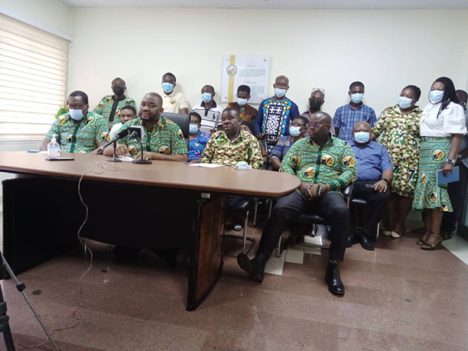The Ghana Mineworkers’ Union (GMWU) has launched its Annual Mineworkers’ Week celebration under the theme ‘integrating labour and community interest for socioeconomic development’, with a call for it to be to be institutionalised and celebrated in its birth-month (June every year) every year, among other things.
It is to appreciate and celebrate the hard work and loyalty of members, develop and deepen intimacy, form new partnerships and strengthen existing ones while creating awareness, and to campaign on key issues relating to the mining industry.
Commemoration of the maiden Annual Mineworkers’ Week begins today – Monday, June 21, 2021 and ends on Friday, June 25, 2021.
As part of the celebration, a number of activities have been earmarked key, and among them is included: hoisting of Ghana Mineworkers’ Union flags and distribution of Mineworkers’ Union paraphernalia across all our constituencies; courtesy calls on key stakeholders – particularly in mining communities; and a campaign on the glaring infrastructural deficit in mining communities, among others.
Mr. Abdul-Moomin Gbana, General Secretary-GMWU, announced a union fully-funded insurance cover (including the member, spouse, two parents or two parents-in-law, and two children) under the Mineworkers’ Union Abusua Insurance Scheme as a special gift to all valued members, beginning August 1, 2021.
Mr. Gbana told the GMWU members present that as the union inches toward its centenary amid increasing uncertainties in the future of work, as well as the complex and unpredictable trade union terrain, trade unions such as the Ghana Mineworkers’ Union have very few options but to innovate in order to respond to these inevitable changes.
“Thanks to our forebears, 77 years on the narrative about the mine worker in Ghana and the mining industry in general has improved quite significantly – even though there is still a lot to be done.”
The Ghana Mineworkers’ Union is the most representative trade union organisation in the extractive industry of Ghana, with a current membership of over 13,000 made up of both blue- and white-collar workers.
It emanated from the Gold Coast Miners Union, now the Ghana Mineworkers’ Union, and was born in June 1944 at Abosso – a few kilometres from Tarkwa in the Western Region.
As fate would have it, the birth of the Ghana Mineworkers’ Union 13 clear years before the independence of Ghana allowed it to become a key force alongside others like the Railway Workers Union in Ghana’s emancipation struggle, as miners all over the country were consistently at the forefront of the struggle.
They worked very long hours and were paid a pittance, had no social protection – and in some instances occupational injuries/diseases and fatalities were rampant features of the workplace.










